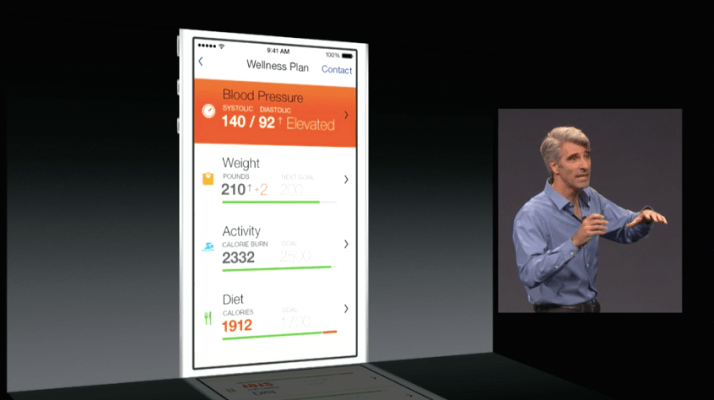Apple‘s HealthKit is coming in iOS 8, and reports about the current beta version of the software paint it mostly as an empty vessel waiting for developers to build hooks that connect their data to the hub, as well as leverage the data volunteered by other apps and the user to inform their own health and fitness software. But Apple isn’t just waiting to see what people will build; behind the scenes, it has been having discussions with Mount Sinai, The Cleveland Clinic, Johns Hopkins and EHR provider Allscripts, according to a new report by Reuters.
These are in addition to partners Apple had previously revealed for the platform, including the Mayo Clinic and EHR software-maker Epic. But the expansive nature of Apple’s discussions with top health care providers suggest that the company is serious about filling HealthKit not just with made-up health metrics like ‘NikeFuel’ or steps that give a general indicator of one facet of fitness but don’t really act as a medical measure.
Apple’s desire to bring on partners that include medical professionals and institutions (many of which are already using iPads anyway) could present it with some considerable challenges: The more comprehensive the iPad becomes as a medical device, the more it becomes subject to government regulations and safety nets put in place to protect customer and patient data. There’s HIPAA compliance, which will likely be required if Apple’s HealthKit stores any real medical records and makes that available to other apps, for instance.
These hurdles make it hard for startups to innovate in healthcare-related software and services, but Apple has advantages when it comes to finding its way through the thorny maze that is healthcare regulation, because of its influence on Capitol Hill and the size of its available resource pool – including its more than $160 billion in cash reserves.
HealthKit itself is likely designed specifically with lessening Apple’s risk in terms of regulatory matters and the involvement of bodies like the FDA, as Apple has reportedly been taking to the FDA to discuss its obligations around HealthKit.
The time and investment required to get HealthKit ready and able to support genuine medical use is probably great, but the benefit that Apple stands to gain in doing so is greater. Competitors like Google have offered fitness hub-type functionality too (Google Fit), but Apple could be first to market with something that affects a user’s general wellbeing in non-trivial ways. And that’s a market advantage that will have impact far beyond flashy hardware features like a better camera or a bigger screen, in the long run.
